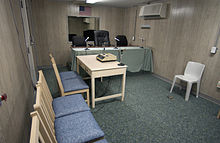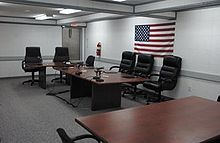- Muhsin Muhammad Musheen Moqbill
-
Muhsin Muhammad Musheen Moqbill Born Ta'iz, Yemen Detained at Guantanamo ISN 193 Charge(s) No charge (held in extrajudicial detention) Status Repatriated Muhsin Muhammad Musheen Moqbill is a citizen of Yemen, who was held in the United States Guantanamo Bay detainment camps, in Cuba.[1] His Guantanamo Internment Serial Number was 193. The Department of Defense reports that Moqbill was born in Ta'iz, Yemen. Unlike almost all the other detainees American intelligence analysts didn't offer an estimate of Moqbill's age. Moqbil was repatriated without ever been charged on December 15, 2006.[2]
Contents
Combatant Status Review Tribunal
 Combatant Status Review Tribunals were held in a 3 x 5 meter trailer. The captive sat with his hands and feet shackled to a bolt in the floor.[3][4] Three chairs were reserved for members of the press, but only 37 of the 574 Tribunals were observed.[5]
Combatant Status Review Tribunals were held in a 3 x 5 meter trailer. The captive sat with his hands and feet shackled to a bolt in the floor.[3][4] Three chairs were reserved for members of the press, but only 37 of the 574 Tribunals were observed.[5]
Initially the Bush administration asserted that they could withhold all the protections of the Geneva Conventions to captives from the war on terror. This policy was challenged before the Judicial branch. Critics argued that the USA could not evade its obligation to conduct a competent tribunals to determine whether captives are, or are not, entitled to the protections of prisoner of war status.
Subsequently the Department of Defense instituted the Combatant Status Review Tribunals. The Tribunals, however, were not authorized to determine whether the captives were lawful combatants -- rather they were merely empowered to make a recommendation as to whether the captive had previously been correctly determined to match the Bush administration's definition of an enemy combatant.
Summary of Evidence memo
A Summary of Evidence memo was prepared for Muhsin Muhammad Musheen Moqbill's Combatant Status Review Tribunal, on 13 October 2004.[6] The memo listed the following allegations against him:
- a. The detainee is associated with the Taliban:
- The detainee traveled to Afghanistan to fight with the Taliban in response to a fatwa.
- The detainee attended the al Farouq camp for weapons training with the Kalashnikov rifle, PK machine gun, and the rocket propelled grenade (RPG).
- The detainee stayed in the Taliban Center in Quetta, Pakistan.
- b. The detainee engaged in hostilites against the United States or its coalition partners:
- The detainee was issued a Kalashnikov rifle, ammunition, and hand grenades.
- The detainee maintained an armed military post in the vicinity of Bagram, Afghanistan.
- The detainee maintained a Taliban post in the vicinity of Jalalabad, Afghanistan after 11 September 2001.
Transcript
Moqbill chose to participate in his Combatant Status Review Tribunal.[7]
Testimony
Administrative Review Board hearing
 Hearing room where Guantanamo captive's annual Administrative Review Board hearings convened for captives whose Combatant Status Review Tribunal had already determined they were an "enemy combatant".[8]
Hearing room where Guantanamo captive's annual Administrative Review Board hearings convened for captives whose Combatant Status Review Tribunal had already determined they were an "enemy combatant".[8]
Detainees who were determined to have been properly classified as "enemy combatants" were scheduled to have their dossier reviewed at annual Administrative Review Board hearings. The Administrative Review Boards weren't authorized to review whether a detainee qualified for POW status, and they weren't authorized to review whether a detainee should have been classified as an "enemy combatant".
They were authorized to consider whether a detainee should continue to be detained by the United States, because they continued to pose a threat—or whether they could safely be repatriated to the custody of their home country, or whether they could be set free.
Summary of Evidence memo
A Summary of Evidence memo was prepared for Muhsin Muhammad Musheen Moqbill's Administrative Review Board, on 2 May 2005.[9] The memo listed factors for and against his continued detention.
The following primary factors favor continued detention
- a. Commitment
- The detainee traveled to Afghanistan to fight with the Taliban in response to a fatwa issued by Sheik Hamoud Aluoqla [sic] of Saudi Arabia.
- Sheikh Hamud (Al-Uqqla) [sic] is a Saudi Mufti who issued a fatwa calling for Jihad in Afghanistan, and encouraged people to fight Jihad against the Christians and Jews. Al-Uqqla [sic] condoned the 11 September 2001 against the United States and helped raise money for Usama Bin Laden [sic] until the sheikh's death in Saudi Arabia in 2001.
- The detainee was told by Ibrihim Baalawi (Kunya- Abu Khouloud) that this fatwa was issued to get Arabs to fight with the Taliban to form a "True" Muslim state.
- The detainee was given, by Khouloud, a passport, a Pakistani Visa, a Yemen Air ticket (from Sana to Dubai), and $50.00 U.S. currency. He also provided the detainee with detailed travel information for his trip Karachi, Pakistan.
- The detainee traveled to an area of the front line near Bagram, Afghanistan referred to as the Mullah Ibrahiem Center. He remained there for 11-12 months and observed tank and artillery skirmished with the Northern Alliance.
- The detainee maintained a Taliban post in the vicinity of Jalalabad, Afghanistan after 11 September 2001.
- b. Training
- The detainee attended the al Farouq camp for weapons training with the Kalashnikov rifle, PK machine gun, and the rocket propelled grenade (RPG).
- The detainee was personally trained by the head of the al Farouq camp.
- c. Connection/Associations
- The detainee was associated with Ibrahim Ba'alawi also known as Abu Khalud who also lived in Ta'iz, Yemen and actively recruited individuals to fight with the Taliban in Afghanistan.
- The detainee stayed in the Taliban Center in Quetta, Pakistan.
- d. Intent
- The detainee knew his role was a soldier on the lines. At first, he worried about being killed then later "he did not care".
- e. Other Relevant Data
- The detainee traveled to a small village in the Tora Bora mountains and remained there for twenty-six (26) days before crossing the Afghanistan-Pakistan border to a small village where he surrendered his weapon. The detainee walked to a second Pakistani village where he was taken into custody by Pakistani authorities.
The following primary factors favor release or transfer
- a. The detainee was upset that he was misled by Abu Khloud (aka: [sic] Ibraheim Ba'alawi) into doing jihad in Afghanistan. The detainee stated he did not know the Taliban were fighting against Americans but did know they were fighting the Northern Alliance. The detainee stated he opposed Usama Bin Laden [sic] (UBL) because Usama bin Laden's [sic] (UBL) actions were against the Islamic religion. The detainee said he made a mistake by going to Afghanistan and will not make that same mistake. The detainee denied ever being part of al Qaida or ever taking part in any planning against Americans. When released, he will attend a university and study mathematics or physics.
- b. The detainee described al-Qaida and anyone associated with Usama Bin Laden [sic] as "criminals" and blames them for his current predicament. He "hated" Afghanistan and curses the day he set foot in Afghanistan. He did not want to discuss anything regarding Afghanistan. The detainee denied any affiliation with al-Qaeda or anyone associated with Usama Bin Laden [sic].
- c. The detainee stated he has never been asked to pledge a bayat, or oath. He maintains that his only knowledge of al Qaida is through Al Jazeera television broadcasts. The detainee stated he would be willing to undergo a polygraph examination.
Transcript
Moqbill chose to participate in his Administrative Review Board hearing.[10] A 9 page summarized transcript of the unclassified session of his hearing was released. Muhsin Muhammad Musheen Moqbill's Assisting Military Officer read a statement he had prepared, on his behalf. Muhsin Muhammad Musheen Moqbill's statement was not recorded in his transcript.
Response to the factors
Response to Board questions
Board recommendations
In early September 2007 the Department of Defense released two heavily redacted memos, from his Board, to Gordon England, the Designated Civilian Official.[11][12] The Board's recommendation was unanimous The Board's recommendation was redacted. England authorized his transfer on August 16, 2005.
Repatriation
Yemen's President, Ali Abdullah Saleh, demanded the release of the remaining Yemenis held in Guantanamo on December 23, 2006.[13][14] The Yemen Observer identified Mohammed Ahmed al-Asadi, Esam Hamid al-Jaefi and Ali Hussain al-Tais as three of the six Yemeni who had been repatriated the previous week. Al Asadi, the first of the six men to be released, on December 29, 2006, was asked to sign an undertaking promising to refrain from armed activity.[15] On January 7, 2007 the Yemen Times identified two of the three remaining men as Tawfiq Al-Murwai and Muhassen Al-Asskari.[14] Yemen's President, Ali Abdullah Saleh, said the men would be released as soon as Yemeni authorities had cleared them.
On November 26, 2008 the Department of Defense published a list of the dates when captives had left Guantanamo.[16] Muhsin Muhammad Musheen Moqbill was identified as "Muhassen Al-Asskari" by the Yemeni press.
References
- ^ list of prisoners (.pdf), US Department of Defense, May 15, 2006
- ^ "Muhsin Muhammad Musheen Moqbill – The Guantánamo Docket". The New York Times (The New York Times Company). http://projects.nytimes.com/guantanamo/detainees/193-muhsin-muhammad-musheen-moqbill. Retrieved 12 January 2010.
- ^ Guantánamo Prisoners Getting Their Day, but Hardly in Court, New York Times, November 11, 2004 - mirror
- ^ Inside the Guantánamo Bay hearings: Barbarian "Justice" dispensed by KGB-style "military tribunals", Financial Times, December 11, 2004
- ^ "Annual Administrative Review Boards for Enemy Combatants Held at Guantanamo Attributable to Senior Defense Officials". United States Department of Defense. March 6, 2007. http://www.defenselink.mil/transcripts/transcript.aspx?transcriptid=3902. Retrieved 2007-09-22.
- ^ OARDEC (13 October 2004). "Summary of Evidence for Combatant Status Review Tribunal -- Moqbill, Muhsin Muhammad Musheen". United States Department of Defense. pp. page 3. http://www.dod.mil/pubs/foi/detainees/csrt_arb/000201-000299.pdf#3. Retrieved 2007-12-10.
- ^ Summarized transcripts (.pdf), from Muhsin Muhammad Musheen Moqbill's Combatant Status Review Tribunal - pages 81-88
- ^ Spc Timothy Book (Friday March 10, 2006). "Review process unprecedented". JTF-GTMO Public Affairs Office. pp. 1. http://www.jtfgtmo.southcom.mil/wire/WirePDF/v6/TheWire-v6-i049-10MAR2006.pdf#1. Retrieved 2007-10-10.
- ^ OARDEC (2 May 2005). "Unclassified Summary of Evidence for Administrative Review Board in the case of Moqbill, Muhsin Muhammad Musheen". United States Department of Defense. pp. pages 22–24. http://www.dod.mil/pubs/foi/detainees/csrt_arb/ARB_Round_1_Factors_000197-000294.pdf#22. Retrieved 2007-12-10.
- ^ Summarized transcript (.pdf), from Muhsin Muhammad Musheen Moqbill's Administrative Review Board hearing - page 77
- ^ OARDEC (17 May 2005). "Administrative Review Board assessment and recommendation ICO ISN 193". United States Department of Defense. pp. page 75. http://www.dod.mil/pubs/foi/detainees/csrt_arb/ARB_Round_1_Decision_memos_000096-000195.pdf#75. Retrieved 2007-12-10.
- ^ OARDEC (August 16, 2005). "Classified Record of Proceedings and basis of Administrative Review Board recommendation for ISN 193". United States Department of Defense. pp. pages 76–81. http://www.dod.mil/pubs/foi/detainees/csrt_arb/ARB_Round_1_Decision_memos_000096-000195.pdf#76. Retrieved 2007-12-10.
- ^ Nasser Arrabyee (2006-12-23). "Saleh demands release of Guantanamo detainees". Yemen Observer. http://www.yobserver.com/article-11423.php. Retrieved 2006-12-29.[dead link]
- ^ a b "Ex-Guantanamo detainees in detention". Yemen Times. 2007-01-07. http://yementimes.com/article.shtml?i=1014&p=local&a=1. Retrieved 2008-08-18. mirror
- ^ Nasser Arrabyee (2006-12-29). "Guantanamo detainee released". Gulf News. http://archive.gulfnews.com/articles/06/12/29/10092755.html. Retrieved 2006-12-29.
- ^ OARDEC (2008-10-09). "Consolidated chronological listing of GTMO detainees released, transferred or deceased". Department of Defense. http://www.dod.mil/pubs/foi/detainees/09-F-0031_doc1.pdf. Retrieved 2008-12-28.
Categories:- Living people
- Guantanamo detainees known to have been released
- People from Ta'izz
- Yemeni people
- a. The detainee is associated with the Taliban:
Wikimedia Foundation. 2010.
